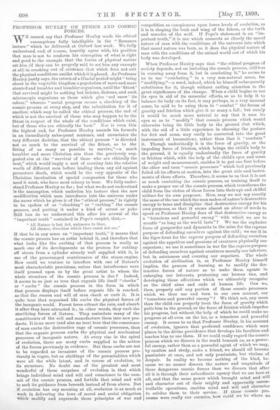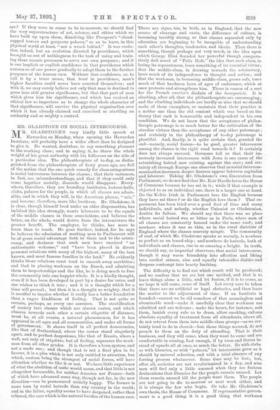PROFESSOR HUXLEY ON ETHICS AND COSMIC FORCES.
WE cannot say that Professor Huxley made his ethical assumptions fully intelligible in the " Romanes lecture" which he delivered at Oxford last week. We fully understand, and, of course, heartily agree with, his position that man is not to conform his conception of what is right and good to the example that the forces of physical nature set him (if they can be properly said to set him any example at all) in crushing out of existence that which does not suit the physical conditions amidst which it is placed. As Professor Huxley justly says, the return of a Glacial period might "bring about in the vegetable kingdom a population of more and more stunted and humbler and humbler organisms, until the fittest' that survived might be nothing but lichens, diatoms, and such microscopic organisms as those which give 'red snow' its colour," whereas "social progress means a checking of the cosmic process at every step, and the substitution for it of another, which may be called the ethical process, the end of which is not the survival of those who may happen to be the fittest in respect of the whole of the conditions which exist, but of those who are ethically the best." Nor is even this the highest end, for Professor Huxley amends his formula in an immediately subsequent sentence, and enunciates the very different doctrine, that the ethical process "is directed not so much to the survival of the fittest, as to the fitting of as many as possible to survive,"—a much humbler and more Christian aim than the previously sug- gested aim at the "survival of those who are ethically the best," which would imply a sort of scrutiny into the relative worth of different men before lending them any aid against premature death, which would be the very opposite of the Christian inculcation of special compassion for those who need it most, who have most misery to bear. We filly under- stand Professor Huxley so far ; but what we do not understand is the assumption which underlies his lecture that the new modification which man introduces into the universe under the name which he gives it of the "ethical process," is rightly ix) be spoken of as " checking " or " curbing " the cosmic process, and putting it under a kind of arrest or yoke. Still less do we understand this after his avowal of the "important truth" contained in Pope's couplet, that,— " All Nature is but Art, unknown to thee, All chance, direction which thou canst not see."
If that be in any sense an "important truth," it means that the cosmic process has an artist behind it, and therefore that what looks like the curbing of that process is really as much one of its developments as the process for cutting. off steam from a cylinder already well supplied with it, is one of the prearranged contrivances of the steam.engine. How could we venture to interfere with one of Nature's most characteristic provisions, unless that interference were itself pressed upon us by the great artist to whom the whole structure of the cosmic process is due P Indeed, it seems to us just as true that organic life itself " checks " or " curbs " the cosmic process in the form in which that process displays itself before organic life is reached, as that the reason and will of man check or curb it. It is quite true that organised life curbs the physical forces of the inorganic world. Forest trees attract the rain, and absorb it after they have attracted it ; in other words, they curb the sterilizing forces of Nature. They assimilate many of the constituents of the soil and manufacture them into new pro- ducts. It is no more (and also no less) true that the conscience of man curbs the destructive rage of cosmic processes, than that the organic process curbs the physical and mechanical processes of inorganic nature. At every rise in the spiral of evolution, there are many curbs supplied to the action of the forces previously in evidence. But these curbs are not to be regarded as invasions of the cosmic process pre- viously in vogue, but as elicitings of the potentialities which were all the while latent, and in course of evolution, in its structure. No doubt one of the greatest and most wonderful of these surprises of evolution is that which brings individual mind and will and conscience to the sum- mit of the cosmic process, and forbids that mind and will to seek its guidance from beneath instead of from above. But if evolution has any meaning at all, evolution is as much at work in delivering the laws of moral and social obligation which modify and supersede those principles of war and competition so conspicuous upon lower levels of evolution, as it is in shaping the beak and wing of the falcon, or the teeth and muscles of the wolf. If Pope's statement is an "im- portant truth," it is one which connects as closely the moral nature of man with the conditions of the universe into which that moral nature was born, as it does the physical nature of man with the conditions of the animal world out of which his body was developed.
When Professor Huxley says that "the ethical progress of society depends, not on imitating the cosmic process, still less in running away from it, but in combating it," he seems to as to use " combating " in a very non-natural sense, for " modifying,"—a word, indeed, which he himself subsequently substitutes for it, though without calling attention to the great significance of the change. When a child begins to use its eyes in aid of its muscular efforts, so as to help it to balance its body on its feet, it may perhaps, in a very unusual sense, be said to be using them to " combat " the forces of gravity and friction which give it so many a fall ; but surely it would be much more natural to say that it uses its eyes so as to " modify " that cosmic process which would otherwise bring its little body to the ground (but which, with the aid of a little experience in choosing the posture for feet and arms, may easily be converted into the great instrument of locomotion), rather than that it " combats " it. Though undoubtedly it is the force of gravity, or the impeding force of friction, which brings the child's body to the ground, it is equally undoubtedly the force of gravity or friction which, with the help of the child's eyes and sense of weight and measurement, enables it to put one foot before the other and turn "cosmic processes" which had previously foiled all its efforts at motion, into the great aids and instru- ments of these efforts. Therefore, it seems to us that it is not so much combating the cosmic process, as training itself to make a proper use of the cosmic process, which transforms the child from the victim of these forces into their apt and skilful utiliser for its own purposes. Now, may we not say exactly the same of the use which the man makes of nature's destructive energy to tame and discipline that destructive energy for his own purposes, so that it seems almost an abuse of words to speak as Professor Huxley does of that destructive energy as a "tenacious and powerful enemy" with which we are to wrestle "as long as the world lasts" P We use the explosive force of gunpowder and dynamite in the mine for the express purpose of defending ourselves against the cold ; we use it in the tiger-hunt for the express purpose of defending ourselves against the appetites and passions of creatures physically our superiors ; we use it sometimes in war for the express purpose of defending ourselves against creatures morally our inferiors, but in astuteness and cunning our superiors. The whole evolution of civilisation is, as Professor Huxley himself implies, the process of learning so to modify the des- tructive forces of nature as to make them agents in enlarging our interests, protecting our human ties, and developing those affections which we ultimately recognise as the chief aims and ends of human life. Can we, then, properly call any portion of those cosmic processes which we thus use and turn to our own account, our "tenacious and powerful enemy" P We think not, any more than the child can properly treat the force of gravity which pulls him to the ground, or the force of friction which impedes his progress, but without the help of which he could make no progress at all even on the ice, as a tenacious and powerful enemy. It seems to us that Professor Huxley, in his account of evolution, ignores that profound confidence which man places in the divine providence that develops his faculties and teaches him to use them. If we could really regard the cosmic process which we discern in the world beneath us, as a power- ful enemy, rather than as a powerful agent of which we may, by caution and study, make a friend, we should all become pessimists at once, and not only pessimists, but victims of despair. In reality we become nothing of the kind, be- cause we no sooner discern the nature and magnitude of these dangerous cosmic forces than we discern that after all it is through their subordinate agency that we are here at all, and that the same power which brought mind and will and character out of their mighty and apparently uncon- trollable operations, enables mind and will and character to subdue them to their service. If these cosmic pro. ceases were really our enemies, how could we be where we
are P If they were to cease to be to-morrow, we should find the very superstructure of art, science, and ethics which we have built up upon them, dissolving like Prospero's " cloud- capped towers and gorgeous palaces," so as to leave, in this physical world at least, "not a wrack behind." It was evolu- tion indeed, but an evolution directed by providence, which brought us out of nothingness to the task of using and train- ing these cosmic processes to serve our own purposes ; and it is our implicit or explicit confidence in that providence which assures us of our power gradually to adapt them to the further purposes of the human race. Without that confidence, or, to call it by a truer name, that trust in providence, man's higher faculties could never have asserted themselves ; and with it, we may surely believe not only that man is destined to grow into still greater significance, but that that part of man which gives him his significance, and which has evolved an ethical law so imperious as to change the whole character of that significance, will survive the physical organisation over which it has already claimed and exercised so startling an authority and so mighty a control.



































 Previous page
Previous page